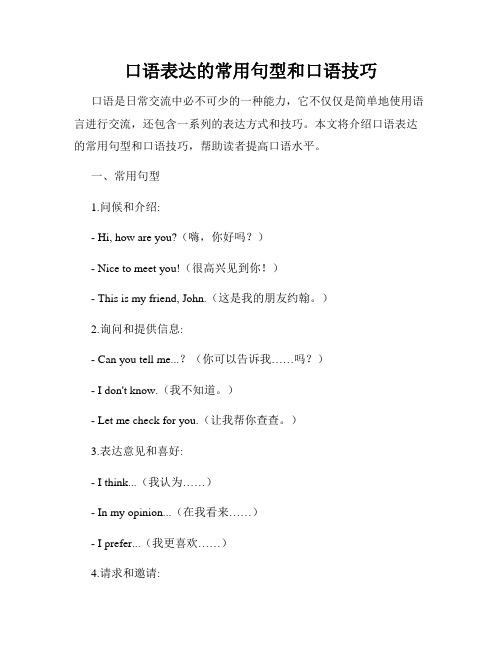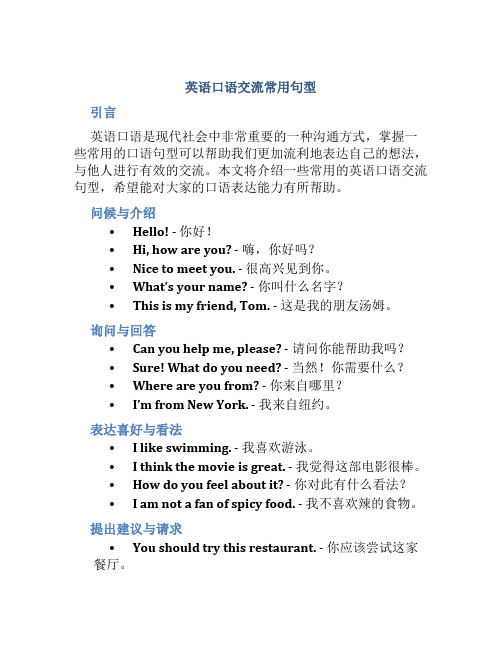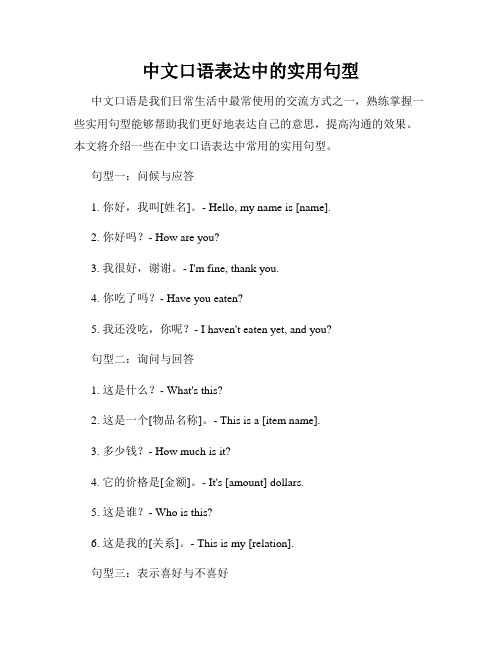口语中常用的功能句型表达汇总
口语常用表达

口语常用表达一、问候和介绍在日常生活和社交场合中,问候和介绍是非常常见的场景。
下面是一些口语常用表达,帮助你更好地应对这些情况。
1. 问候:- Hi!/Hello!:你好!- How are you doing?/How are you?:你好吗?- What's up?:最近怎么样?- Long time no see!:好久不见!2. 介绍自己:- Let me introduce myself. My name is [your name].:让我来介绍自己,我叫...- Hi, I'm [your name]. Nice to meet you.:嗨,我是...很高兴认识你。
- Nice to meet you, too.:我也很高兴认识你。
3. 介绍他人:- This is [名字]. He/She is my friend.:这是...他/她是我的朋友。
- Have you met [名字]?:你见过...吗?二、表示意见和建议在讨论问题或提供解决方案时,需要用到一些表示意见和建议的常用表达。
1. 表达意见:- In my opinion...:我个人认为...- From my point of view...:从我的角度来看...- I believe/think that...:我相信/认为...2. 提出建议:- I suggest/recommend that...:我建议/推荐...- How about...?:...怎么样?- You could/should...:你可以/应该...三、谈论兴趣爱好在社交场合或与他人交流时,谈论兴趣爱好是增进彼此互动的好方式。
以下是一些常用表达来分享和询问他人的兴趣爱好。
1. 谈论自己的兴趣爱好:- I enjoy [activity/hobby].:我喜欢...- My hobbies include [hobby1], [hobby2], and [hobby3].:我的爱好包括...- I'm really into [activity/hobby].:我对...很感兴趣。
口语表达的常用句型和口语技巧

口语表达的常用句型和口语技巧口语是日常交流中必不可少的一种能力,它不仅仅是简单地使用语言进行交流,还包含一系列的表达方式和技巧。
本文将介绍口语表达的常用句型和口语技巧,帮助读者提高口语水平。
一、常用句型1.问候和介绍:- Hi, how are you?(嗨,你好吗?)- Nice to meet you!(很高兴见到你!)- This is my friend, John.(这是我的朋友约翰。
)2.询问和提供信息:- Can you tell me...?(你可以告诉我……吗?)- I don't know.(我不知道。
)- Let me check for you.(让我帮你查查。
)3.表达意见和喜好:- I think...(我认为……)- In my opinion...(在我看来……)- I prefer...(我更喜欢……)4.请求和邀请:- Could you please help me?(你可以帮个忙吗?)- Would you like to join us?(你想和我们一起吗?)- Can you lend me some money?(你能借我一些钱吗?)5.谈论过去的经历:- Last summer, I traveled to Europe.(去年夏天,我去了欧洲。
)- When I was a child, I used to ride a bike every day.(我小的时候,每天都骑自行车。
)- I have never been to Japan.(我从未去过日本。
)二、口语技巧1.积极倾听:要成为一个出色的口语表达者,积极倾听是至关重要的。
不仅要听懂别人说的话,还要表现出对对方的尊重和兴趣。
要避免打断对方,在听到不懂的地方,可以礼貌地请对方重复。
2.流利表达:流利地表达自己的意思是每个口语者的目标。
为了达到这个目标,我们需要不断地练习口语并培养语感。
口语功能句型及答题常用理由

口语功能句型及答题常用思路理由1:学业/工作繁忙->做某事可以放松心情基本逻辑:作为一个学生,需要做很多作业,所以压力很大,需要放松舒适心情,更好地应对未来的学习,做这件事能够让我释放压力,更有效地学习。
As a university student, I am always preoccupied with tons of assignments, such as my essays, group projects and oral presentations, to name just a few. So it comes as no surprise that I am confronted with huge pressure. Therefore, I need certain ways to boost my energy level so that I can better concentrate on my future studies. For instance, by doing something, I can release my stress and refresh my mind, preparing me to learn more efficiently and effectively.理由2:学业/工作繁忙->家人和朋友关系疏远基本逻辑:作为一个学生,需要做很多作业,所以没有时间和家人朋友沟通。
时间一长关系就疏远了。
As a university student, I am always preoccupied with tons of assignments, such as my essays, group projects and oral presentations, to name just a few. So it comes as no surprise that I have little extra time to communicate with my family and friends. As time passes by, we may drift apart and become less close with each other.题目1&2Do you agree or disagree with the followin g statement: it’s easier to be an adult than it is to be a child?Do you agree or disagree with the statement: employees should be allowed to listen to music at work?Some people prefer to wash dishes by using a dish washer. Others prefer to wash dishes by hands. Which do you prefer and explain why?Which do you prefer, large department stores or small boutiques? Please give your answer with specific details and examples.Do you agree or disagree with the following statement: it is more important to maintain relationship with family members than friends?Do you think it is a good idea for your university to build a café on campus?Do you agree or disagree that students will learn more if teachers assign a lot of homework?Do you prefer a big family or a small family? Please give your answer with specific examples and details.理由3:学习新技能->提高竞争力基本逻辑:做某事能帮我学习什么样的技能,所以这样能够提高我之后步入社会的竞争力。
英语口语交流常用句型

英语口语交流常用句型引言英语口语是现代社会中非常重要的一种沟通方式,掌握一些常用的口语句型可以帮助我们更加流利地表达自己的想法,与他人进行有效的交流。
本文将介绍一些常用的英语口语交流句型,希望能对大家的口语表达能力有所帮助。
问候与介绍•Hello! - 你好!•Hi, how are you? - 嗨,你好吗?•Nice to meet you. - 很高兴见到你。
•What’s your name? - 你叫什么名字?•This is my friend, Tom. - 这是我的朋友汤姆。
询问与回答•Can you help me, please? - 请问你能帮助我吗?•Sure! What do you need? - 当然!你需要什么?•Where are you from? - 你来自哪里?•I’m from New York. - 我来自纽约。
表达喜好与看法•I like swimming. - 我喜欢游泳。
•I think the movie is great. - 我觉得这部电影很棒。
•How do you feel about it? - 你对此有什么看法?•I am not a fan of spicy food. - 我不喜欢辣的食物。
提出建议与请求•You should try this restaurant. - 你应该尝试这家餐厅。
•Could you please pass me the salt? - 你能帮我递一下盐吗?•Let’s go for a walk. - 我们一起去散步吧。
•Would you mind turning down the music? - 你介意把音乐音量调小吗?结尾礼貌用语•Thank you for your help! - 谢谢你的帮助!•Please take care. - 请保重。
•Have a nice day! - 祝你有一个愉快的一天!•Goodbye. - 再见。
中文口语表达中的实用句型

中文口语表达中的实用句型中文口语是我们日常生活中最常使用的交流方式之一,熟练掌握一些实用句型能够帮助我们更好地表达自己的意思,提高沟通的效果。
本文将介绍一些在中文口语表达中常用的实用句型。
句型一:问候与应答1. 你好,我叫[姓名]。
- Hello, my name is [name].2. 你好吗?- How are you?3. 我很好,谢谢。
- I'm fine, thank you.4. 你吃了吗?- Have you eaten?5. 我还没吃,你呢?- I haven't eaten yet, and you?句型二:询问与回答1. 这是什么?- What's this?2. 这是一个[物品名称]。
- This is a [item name].3. 多少钱?- How much is it?4. 它的价格是[金额]。
- It's [amount] dollars.5. 这是谁?- Who is this?6. 这是我的[关系]。
- This is my [relation].句型三:表示喜好与不喜好1. 你喜欢[物品/活动]吗?- Do you like [item/activity]?2. 我喜欢。
- I like it.3. 我不喜欢。
- I don't like it.4. 你喜欢什么颜色?- What color do you like?5. 我喜欢[颜色]。
- I like [color].句型四:提出建议与请求1. 你可以帮我吗?- Can you help me?2. 你觉得怎么样?- What do you think?3. 我建议[建议内容]。
- I suggest [suggestion].4. 可以给我一些建议吗?- Can you give me some advice?5. 我想请你帮个忙。
- I need your help.句型五:询问与告知方位1. 这里是哪里?- Where is this?2. 它在[方位/地点]。
口语表达知识点总结

口语表达知识点总结一、基本句型口语表达中的基本句型是指一个句子的基本结构,包括主语、谓语和宾语。
在口语表达中,我们经常使用以下几种基本句型:1. 主语 + 动词例如:I eat breakfast every morning.(我每天早上吃早餐。
)2. 主语 + 动词 + 宾语例如:She likes dancing.(她喜欢跳舞。
)3. 主语 + 动词 + 间接宾语 + 直接宾语例如:He gave me a book.(他给了我一本书。
)4. 主语 + 动词 + 宾语 + 宾补例如:They elected her president.(他们选她当总统。
)二、口语交际用语口语表达中的交际用语是指日常对话中常用的一些句子或短语,用于与他人进行交流。
掌握这些口语交际用语可以帮助我们更流利地进行口语表达。
1. Greetings(问候)- Hello!(你好!)- How are you?(你好吗?)- Nice to meet you!(很高兴见到你!)2. Introductions(介绍)- Let me introduce myself.(让我来介绍一下自己。
)- This is my friend, Lisa.(这是我的朋友丽莎。
)- I'm from China.(我来自中国。
)3. Expressing opinions(表达观点)- In my opinion, learning English is important.(我认为学习英语很重要。
)- I think we should protect the environment.(我认为我们应该保护环境。
)- Personally, I prefer playing sports.(个人而言,我更喜欢运动。
)4. Asking for help(寻求帮助)- Could you please help me?(你能请帮忙吗?)- Can you show me the way to the bus station?(你能告诉我去汽车站的路吗?)- I'm sorry, but I'm lost. Can you help me find my way back?(对不起,我迷路了,你能帮我找到回去的路吗?)5. Making suggestions(提出建议)- Why don't we go to the movies tonight?(我们今晚为什么不去看电影呢?)- Let's have a party to celebrate your birthday!(让我们开个派对庆祝你的生日!)- How about going for a walk?(出去散散步怎么样?)三、常用口语短语除了基本句型和口语交际用语外,一些常用的口语短语也是口语表达中的关键部分。
英语口语基本交流句型有哪些

英语口语基本交流句型有哪些英语口语在日常交流中非常重要,掌握一些基本的交流句型可以帮助我们更流利地表达自己的意思。
下面列举一些常用的英语口语基本交流句型,希望对大家提高口语表达能力有所帮助。
打招呼问候1.How are you? - 你好吗?2.What’s up? - 最近怎么样?3.Hi, how are you doing? - 嗨,你好吗?自我介绍1.My name is [name]. - 我叫[name]。
2.I’m from [place]. - 我来自[地方]。
3.Nice to meet you. - 很高兴见到你。
询问问题1.What’s your name? - 你叫什么名字?2.Where are you from? - 你来自哪里?3.How old are you? - 你多大了?表达意见1.I think… - 我认为…2.In my opinion… - 在我看来…3.Personally, I believe… - 就我个人而言,我认为…请求帮助1.Could you help me, please? - 你可以帮我一下吗?2.I need your assistance. - 我需要你的帮助。
3.Can you show me how to…? - 你可以告诉我如何…吗?谢谢和道歉1.Thank you very much. - 非常感谢你。
2.I’m sorry. - 对不起。
3.Excuse me. - 不好意思。
结尾礼貌用语1.Goodbye. - 再见。
2.See you later. - 再见。
3.Have a nice day. - 祝你有个愉快的一天。
以上是一些常见的英语口语交流句型,希望大家通过不断练习,能够更加流利地运用英语进行日常交流。
祝愿大家英语口语越来越好,与世界更好地交流!。
口语表达日常生活中常用口语表达

口语表达日常生活中常用口语表达口语表达是我们日常生活中的重要组成部分,能够帮助我们与他人进行有效的交流。
在日常对话中,使用一些常用的口语表达可以使我们更流利地表达自己的意思,增加交流的效果。
下面是一些常用的口语表达,希望对大家有所帮助。
一、问候与寒暄1. 早上好! Good morning!2. 下午好! Good afternoon!3. 晚上好! Good evening!4. 你好吗? How are you?5. 很高兴见到你! Nice to meet you!6. 最近过得怎么样? How have you been lately?7. 你上周末都做了些什么? What did you do last weekend?8. 祝你有个美好的一天! Have a nice day!二、表达喜欢与不喜欢1. 我喜欢... I like...2. 我不喜欢… I don't like...3. 我对…感兴趣。
I'm interested in...4. 我对…没兴趣。
I'm not interested in...5. 我热爱… I love...6. 我讨厌… I hate...7. 这是我最喜欢的... This is my favorite...8. 这是我最不喜欢的... This is my least favorite...三、表达赞美与感谢1. 你做得很好! You did a great job!2. 你真棒! You're awesome!3. 非常感谢你的帮助! Thank you so much for your help!4. 我很感激你的支持! I really appreciate your support!5. 谢谢你陪我度过了愉快的时光! Thank you for a wonderful time!四、表达意见与建议1. 我认为... I think...2. 我觉得... I feel...3. 我认为这是一个好主意。
- 1、下载文档前请自行甄别文档内容的完整性,平台不提供额外的编辑、内容补充、找答案等附加服务。
- 2、"仅部分预览"的文档,不可在线预览部分如存在完整性等问题,可反馈申请退款(可完整预览的文档不适用该条件!)。
- 3、如文档侵犯您的权益,请联系客服反馈,我们会尽快为您处理(人工客服工作时间:9:00-18:30)。
口语中常用的功能句型表达汇总Compiled by Samonlyone@1. Talking About Personal Habits2. Expressing Likes and Dislikes3. Expressing Reasons for Likes and Dislikes4. Expressing a Preference5. Comparing6. Talking About Recent Changes7. Contrasting8. Suggesting9. Expressing Opinions10. Giving Reasons for Opinions11. Explaining12. Speculating (Guessing When You Don't Know)13. Speculating (guessing) About the Future14. Expressing Plans, Intentions and Hopes for the Future15. Clarifying16. Explaining a Word When you have Forgotten (or don't know) the Word17. Speaking in General1. Talking About Personal HabitsExample question: What do you usually do in the evenings?1.I usually ...2.I often ...3.While I'm studying I usually ...4.Sometimes I ....5.As a rule, I ...6.Whenever I can I ...2. Expressing Likes and DislikesExample question: What kinds of music do you like?1.My favourite ... is ...2.I like ...3.I enjoy ...4.I'm (quite/rather) keen on ...5.I just love ...6.I absolutely adore ....7.I'm crazy about ...8.I'm addicted to ...9.I'm really into ...10.I don't mind ...11.As far as .... is concerned, I can take it or leave it.12.I don't care too much for ... = I'm not really into ...13.My least favourite .... is ...14.I dislike ...15.I can't stand ...16.I hate ... (extreme language)17.I find ...3. Expressing Reasons for Likes and Dislikes1.... because ...2.... since ...3.The main reason I like...... is that it's ......4.What I like best about ..... is .....5.The thing I like best about ..... is ......6.The best/worst thing about ... is ...7.I don't like that very much because it's too ......8.That's because I find it ......4. Expressing a PreferenceExample question: Do you (or, would you) prefer to travel alone or with others? (e.g., a friend)1.I prefer ... because2.My preference is ... because ...3.I prefer A to B because ...4.If I had the choice, I'd + V ... because ... (假设的话)5.If I had the choice, I'd rather + V... because ... (假设的话)6.If I have the choice, I'll + V .... (a real possibility for the future) 5. ComparingExample question:What are the differences between modern art in China and traditional Chinese art?1.A is bigger than B.2.B is not as big as A.You can also use some of these:∙Use “much” as in, “A is much better / worse than B”.∙“A is not nearly as good as B.”∙“B is nowhere near as big as A”∙“A is not quite as important as B.”∙“A is almost as important as B, but not quite.”∙“In comparison to B, A is quite big.”Or, “A is quite big in comparison to B”.∙“Compared to B, A is a lot bigger.”6. Talking about Recent Changes= Comparing the recent past and the presentExample question:Has your hometown changed much in the past few years? (e.g. 20 years)Yes, it has. For example, ...∙Today there are many more cars on the roads than there were thirty years ago.( ... there are/is more_____ than there were/was ....) ∙The air pollution is much worse/much better than it used to be.( ______ is more ____ than it used to be.)∙Compared to thirty years ago, the population of the city has increased by about two million.(Compared to thirty years ago, _______ has + 过去分词)∙The population of the city has increased by about two million people in the last thirty years.(______ has + 过去分词in the last thirty years) ∙More people today own a car than was the case thirty years ago.(More _________ today + present tense than was the case thirty years ago.)∙Today, more and more people are living in high-rise apartment buildings whereas thirty years ago, we had very few high-rise apartments buildings in our city.(Today ______ are + 现在分词whereas thirty years ago + past tense)More and more large-scale supermarkets are being built nowadays but there were very few of them in my hometownthirty years ago(More and more ________ are being + 过去分词 nowadays but + past tense thirty years ago.)7. ContrastingThe question is usually 'a compare question'. When you answer one of these questions, you can use a contrasting statement. However, since the grammar of the comparing answers (see above) is more difficult, you will impress the examiner more by mostly using that, rather than by using contrasting statements.Example: "A is big but B is small."(____ is _____ but _____ is ____)8. SuggestingExample questions:What would you suggest a visitor to your country see and do?What do you think the government could/shoulddo?1.I'd .... (suggest, recommend, say, tell him/her/them) ....2.Maybe/perhaps/possibly ... + could / should ...3.It might/may help if ....+ past tense form of verb4.It would probably + (be a good idea, be useful, help) if + pasttense form of verb5.I .... (suggest, recommend, say) ....9. Expressing OpinionsExample question:Do you think that children should always be offered an incentive (a reward of some kind) when parents ask their children to do something?1.I think ...2.I believe ...3.I feel ...4.Personally, I (think, believe, feel) ...5.I tend to + (think, feel, believe) that ...6.In my opinion, ...7.In my view, ...8.I've always + (thought/believed/felt) that ...9.I maintain that ...10.I've always maintained that ...11.It seems to me that ...12.I'm convinced that ...13.As far as I'm concerned, ...14.My view is that ...15.From my point of view, ...16.To my mind, ...17.The way I see it, ...18.As I see it, ...10. Giving Reasons for Opinions1.... because ...2.... since ...3.The main reason I say that is because ...4.One of the reasons I say that is because ... (One reason I saythat is because ... )11. ExplainingExample question: Why are many older people reluctant to learn computer skills?1.The reason why ... is because / is that ...2.The main reason why ... is because / is that ...3.One reason why ... is because / is that ...4.One possible explanation (for that) is ...5.To understand why ....., you first need to..... (understand, know,be aware that)6.Well, it's like this...7.You could look at it this way: ...12. Speculating (= Guessing When You Don't Know)(When talking about the present or the past)Example question: Do old people in China have opportunities to attend any forms of classes?1.Well, I'm not sure but ...2.Well, I've never thought about that before but ...3.I imagine ...4.I guess ...5.I suppose ...6.I'd say...13. Speculating (= guessing) About the Future(Most commonly, how the future will change, compared to now.) Example question: How do you think the tourist industry (in China) will develop in the future?1.I predict ... + a noun2.I (can) foresee ... + [a noun + 现在分词] or + a noun3.I imagine / suppose / guess ...4.... will + adverb (or, adverb + will)5.... be (present tense) likely to ...6.... be (present tense) bound to ...7.... be (present tense) + going to + V (原形动词) = "will" + V (原形动词)8.There’ll probably / possibly be ...9.We might see / have ...10.... will be + 现在分词 ...11.... might be + 现在分词 ...12.I'd be surprised if + past tense/past continuous tense13.I'll be very surprised if + present tense/past continuous tense14.I expect ..14. Expressing Plans, Intentions and Hopes for the Future Example question: What are your future work plans? (after you graduate)1.I plan to ...2.My plan is to ...3.I plan on + V ing (动名词)4.I intend to ...5.I hope to ...6.I'm going to ...7.My ambition is to ...8.My immediate goal is to ...9.My ultimate (= final) goal is to ...10.Ultimately, ...11.Hopefully, ...12.Ideally, ...13.I expect to ...14.I’d like to ... = I want to ..15.As an alternative, I might ...16.If all goes well, I'll / I should ...17.If everything goes according to plan, I'll / I should ...18.My dream is to ...19.It's always been my hope/plan/ambition/dream to ...20.My heart is set on + Ving (动名词)15. Clarifying1.What I mean is ..2.My meaning is ....3.In other words,4.That is to say, ...5.Let me put that another way.6.To put that another way, ...7.What I'm trying to say is ..8.My point is that ...9.More specifically, ...10.For example, ...11.For instance, ...16. Explaining a Word When you have Forgotten (or don't know) the Word"I can't remember the word but .....1.it's a thing that ...2.it's a type of ...3.it's something you ...4.he's a person who ...5.it's something like ...6.it's similar to ...7.it's kind of like a ..."These sentences use the present tense because you are speaking in general. For example, "It's a thing, a tool that you use to put air into your bicycle tyre - you use it like this" (Show the action). (a bicycle pump)17. Speaking in General1.On the whole,2.As a rule, ...3.In general,4.Generally, ...5.Generally speaking,6.For the most part, ...7.Typically,ually。
